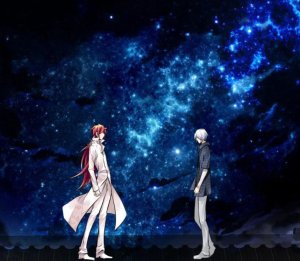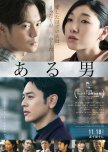
Cette critique peut contenir des spoilers
Profoundly brilliant - what manner of man is this ɿ(・ه・)ɾ
WOW ... . this was a deep and mind blowingly good movie!! It reminded me a little of Blank 13. I thought I was going to watch a bit of a mystery but it turned out to be so much more than the mystery of a dead man's back story. It literally was an existential 'man hunt' ... a hunt for what it is that defines a man ... a person ... a hunt for identity.This was not apparent to me at first. The movie moved slowly and I wondered why are they going so slow ... hurry up and get to the juicy mystery bits. Then it jumped some years ... and then there were flashbacks ... and I was wondering what the point of it all was ... and then it hit me ... this was not just about "a" man hunt ... but a multiple man hunt and not just for the men but for their identities, both from an external point of view and an internal point of view. The movie then became entirely fascinating for me ... nothing was irrelevant ... the script was so good it allowed a gloriously deep dive into the existential ゚:・*・:◝(ᵔ‿ᵔ)◜:*:・゚.
"Identity' ... in one sense it is such a concrete thing and yet in another sense, it is elusive and ever evolving ... before we are even born we are automatically assigned an identity:
▪ identity from genetics of your biological parents
▪ identify from the time of your birth e.g. before/after marriage; the year / month / day
▪ identity from the order of your birth compared to your siblings ... even the order of birth of your parents in the broader family context
▪ identity from the geographical place of birth ... even the place of birth of your ancestors e.g. born in Japan but your great grandparents were Korean ...
▪ identity from race
▪ identify from culture
▪ identity from your gender
▪ identity from social institutions e.g. the school you went to, the religion you have, the occupation you have; the clubs you belong to; the music you listen to; the hobbies you have
▪ identity from your physical body - the 'perfectness' of it or the 'imperfectness' of it; who/what you look like ... I am the splitting image of my father ... you look like a Korean etc
▪ identity from your state of mind - sane / not sane; smart; stupid;
▪ identity from what your parents do/are - son of a murderer, daughter of a prostitute, son of a doctor etc
▪ identity from where you live, what you wear, the food you eat
▪ identity from your experiences - parenthood; singleness; military service etc
▪ the identity that others assign to you - "hurry up and go back to your 'old self'"
▪ the identity that you think you are ... or should be ... or want to be ...
"Identity" ... so abstract and yet it is such a very heavy thing ... a blessing in its inclusiveness and yet also a weapon of separation and destruction ... something innate and yet something thrust upon you without consent ... what choice do you have with it ... how much of it can you mold and how much of it do you just have to accept as is ... can you escape from it and thereby escape to a different way of life, a different way of being ... how many times have we modified our personality throughout our lives without even knowing ... how did we do that ... is it necessarily a bad thing (˙_˙)ゞ.
I loved the scripting ... as well as the symbolic imagery used throughout ... and the clues that were set up right from the beginning. I liked the different perspectives of a person's identity given from the children to the adults, to friends and family of the main characters ... even to that of strangers. It was very nicely done and the actors did it credit. The scripting was so loaded ... so mind blowingly good. For me this movie is definitely rewatchable. As for the score ... I got so consumed with the story line and all the thoughts that that generated in my mind, I don't even remember the score of the movie ... but I gave it a 10 anyway because whatever it was, it did not detract from the story line at all.
The final scene showing Kido's back as he looked at that painting ... profound. A brilliant movie ... I loved it.
Cet avis était-il utile?
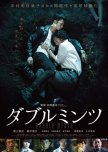
Cette critique peut contenir des spoilers
This is not a fluffy BL story that is for sure. The relationship between the main leads is twisted and intense and S/M abusive. Having said that I didn't regret watching it ... it was sort of interesting thinking about the 'whys' of this strange relationship and some of the unexpected twists that occurred. In short:
For me this movie is about love ... what is it ... who can have it ... and under what circumstances can it be ‘had’. It is a kind of fascinating melding of greek philosophy and S&M. The reason for my thinking this was the reference to Plato’s feast (the TV documentary they were watching on the TV). Maybe I read too much into that TV documentary, but for me it seemed relevant to the story.
In detail:
Plato’s Feast was kind of symposium or talk fest, where all these philosophers ate, drank and talked a whole lot of philosophical shit. In respect of the TV documentary, it particularly referred to the feast held at Agathon’s (a poet) house. At that feast, the topic of discussion was “eros” or “love”. Quite a few philosophers had their say about what they thought “love” was ... in particular:
Pausanias believed that loving attraction was not always sublime, that it could sometimes be ‘base’ because there were two kinds of love from the goddesses Aphrodite (Aphrodite was the Greek goddess associated with love, lust, beauty, pleasure, passion and procreation). One kind of love was Aphrodite Heavenly and the other kind was Aphrodite the Vulgar so therefore it must follow that there were two kinds of love - heavenly love and vulgar love.
Aristophanes, on the other hand, spoke about the myth that original inhabitants of the land were androgynous i.e. they were both male and female at the same time aka the Androgyns. The Androgyns had 4 legs, 4 arms and 2 faces that looked in opposite directions. When they wanted to move, they moved on their 8 limbs like a wheel. The god Zeus didn’t like the Androgyns so he ordered Apollo to cut them into half. Afterwards, even though the Androgyns were now separated, the memory of the connection with their former half gave rise to a desire to search for their other ‘half’ in order to restore their original nature and integrity. However, this was not as easy as it seems as if they were 'wicked' the gods would 'cut' people into even smaller parts.
Anyway, given the above as a kind of background to the story, it is not surprising that the two male leads have the same sounding name Ichikawa Mitsuo … the only difference between the two is how they spell their family name "Ichikawa". One spelt it with the kanji for the number "one" i.e. "Ichikawa" / "一川" (one river). The other spelt it with the kanji for 'city' - "Ichikawa" / "市川" (city river). Is having the same name symbolic of them being each other's other half ... they are the same but different ... same coin, different sides 🤔. This is interesting as when both Mitsuo’s meet in high school … right from the beginning, you can see their two very distinct and seemingly different personalities but there was a hidden S&M kind of connection / attraction between them none the less. Since their first meeting they have 'danced' around each other ... like a pair of orbiting neutron stars that spiral ever closer together. One receives from the other, one gives to the other … one receives abuse, the other gives it … one masochistic, the other sadistic … one gets a girlfriend, the other takes her for himself ... “No. 1” Ichikawa is “City” Ichikawa’s dog and will come to his 'call'.
After high school the two Ichikawa's go their seemingly separate ways. “City” Ichikawa comes from a Yakuza (gangster) world and is a low level ‘dog’ for the Yakuza Boss. “No. 1” Ichikawa is a Systems Analysist and true to his "number" name, is brilliant on coding. They had no contact with each other until that phone call.
When “City” Ichikawa "murders" his girlfriend … the only way he can keep it secret from his Yakuza brothers, is to call his own “dog” from high school. That "City" Ichikawa still has "No. 1" Ichikawa's phone number after all these years is interesting. The rest of the story is really about the “dance” they have with each other against the backdrop of murder and the brutal gangster life … and in doing so, how they slowly grow in awareness that despite how their lives have gone, despite the predicaments they get into, they are best together ... live together, die together. They are two sides of the same coin … each is the "mint" (as in stamping) to one side of the same coin ... one has no meaning without the other ... hence "Double Mints" ... not the peppermint kind but the coin minting kind (well imo).
So this for me is a love story with a twist ... and it is fascinating. Who is it that deserves love … what kind of love do they deserve … ''heavenly love vs 'vulgar love' … if the love is consensual, is one kind of love necessarily 'worse' than another kind of love 🤔 … I am not into S&M but who am I to judge what other people need in their lives so long as it is informed and consensual ... “love is love” be it ‘heavenly love’ or ‘vulgar love’. Interestingly, regardless of the type of love had between people, when it is informed and consensual, there seems to come with it a potential degree of personal 'evolution' … so in that sense can all kinds of love be 'good' love 🤔.
The ending of the movie had an air of bitter sweetness … I think they were both going to Korea knowing they would meet their deaths there … but in so doing, they would meet it together as "one". The movie is a bit of a mind f*ck ... but that is the way I see it at this point in time ... maybe if I watch it again in another year or two I might see things differently ... who knows.
Cet avis était-il utile?

Cette critique peut contenir des spoilers
Lesson in Love ... plot twists and karmic connections ... don't be fooled by face value
This series is a wild water ride of tragedy, plot twists, karmic connections and misdirection. It starts slow but keep watching as it will take you on a ride that you least expected.For me, this was 🌟 EPIC 🌟 storytelling. Don't be mistaken thinking this was a story of a sordid little affair between teacher and student ... there is far more to the story than the description lets on ... the plot is a complex one, the psychology runs deep across multiple characters and yet it flows seamlessly ... it takes you very slowly at first and then before you know it, around half-way, you hit dramatic 'white water' and then things get really rough ... there are twists and turns and hidden rocks below ... what you thought the story was about ... is not what the story is about.
Your emotions are going to get a beating, but at the very end of that intense 'white water' ride of a drama ... the waters suddenly slowed to a gently flow ... at last you could 'float'. I had tears at the end as well, but these tears were of a different kind.
"Lesson in Love" ... yes it was ... and it was a lesson for many of the main characters in this series ... including the viewer watching it. It is a series about people, their pain, their loves, their hidden stories and drivers ... it is a story about unexpected degrees of separation between everyone ... it is the story about the 'face' value of someone's life and actions and the fact that people are definitely not always what they seem to be and because of their hidden lives and/or because of their failure to communicate, it is all too easy to jump to conclusions and 'see' someone's life and what they do to be something that it is not and "kill" them for it.
I have two MVPs in this series. The first is the ML Zhang Yi Xiang ... he is a character that runs deep and is far more that his public face value ... he is so he is 'pure' even when the whole world is against him. I admire that kind of integrity and tenaciousness ... age is not necessarily an indicator for these attributes. Edward Chen did a stellar job with that character.
My next MVP is Yi Xiang's Pa ... not only was he a hot Daddy, but he was just gold in how he respected his son's self determination and saw through the game plays of people around him. I so agreed with him when he said: "if you are not hurting anyone, why would I oppose it." ۹(^ᴗ^)۶
AWESOME series ... I am glad I watched to the end ... I am glad it was not what I thought it would be when I started watching it. It was brilliantly acted, the script was amazing ... nothing was irrelevant at all ... the art of misdirection was superb ... WOW what a ride ... and best of all a HE ...۹(♡´◡`♡)۶
Cet avis était-il utile?
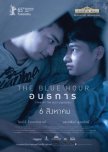
Cette critique peut contenir des spoilers
Disturbing but so fascinating on a psychological / metaphysical level
I first watched this movie about two years ago. It is one that has stayed in my mind ... it is disturbing, somewhat provocative, fascinating, thought provoking and definitely metaphysical. I thought the production, the cinematography and acting were excellent. Altogether they did a wonderful job conveying with some pretty intense emotional states/events. It is a very loaded movie.In short:
The movie takes you into Tam's life and into his state of mind. Both his real world and his mind are pretty horrific places. I wouldn't call the movie a romance by any long shot but there is definitely something "other worldly" and surreal about it. Tam's life is definitely not aspirational. His family constantly told him he was defective because he was gay, that he couldn't be trusted, that he needed to make them proud and care more for them, even though they couldn't care less about him. Having to live with that all your life and to then have the shit kicked out of you at school is enough to do anyone's head in.
Tam was literally caught between a rock and a hard place with no escape ... except to escape into his own mind ... it is his safe haven, but it is so distorted in there ... is what he sees in his mind a reflection of outside reality? Is the 'reality' outside the only 'real' reality 🤔 ... is the 'reality' inside one's mind fake even though it is 'so real' to the owner of that mind 🤔. Tam's mental reality and the reality of the outside world is so blurry ... so much so that at the end of the movie, I think the only "real" things were Tam himself and the murder of Tam's family in the lounge room ... the rest ... well that is the proverbial metaphysical question isn't it ... which reality is the 'real' reality for Tam 🤔
More detailed:
The imagery / symbolism throughout the movie were very evocative and beautifully captured the essence of an altered mind state. There were quite a number of images/scenes that really left an impression on me (I have put the old "Spoiler" cover on as you may want to see the movie first) and influenced the conclusions I arrived out watching the movie:
(1) The algae on the pool walls and in the washroom - so many of them looked like human images to me ... it was kind of like a Rorschach ink blot test. Were these representatives of people in Tam's life? He tried to scrape off one ... I wondered who that might have represented to him ... his Father ... it was right in the centre of the pool wall? Towards the end in the washroom, I really thought the algae on the wall was Phum and as Tam walked back into the wall and rested next to it I thought wow ... is Phum even real? Was the pool facility some kind of giant Rorschach ink blot test for Tam?
(2) The clouds. The clouds in the movie were magnificent and there were a lot of scenes where they formed the major portion of the scene. There was one significant cloud panorama where this massive cloud had hidden the sun and all you could see were the striking crepuscular rays coming through ... it gave the impression that I was on the dark side of something and the light was trying to break its way through the clouds. Was this the case for Tam's mind?
(3) Looking up at the sky while underneath the water. Again this was fascinating ... like the clouds, the water was a barrier to being able to see clearly. Water is a distortion of light and therefore the images scene through it. Also all the waters that Tam sunk beneath were dirty - there were bits of muck floating around and mosquito larvae swimming about. I don't know about where you live but where I live Mosquito larvae are harbingers of disease e.g. Dengue, Ross River etc. Does all of this suggest a "diseased" perspective of Tam?
(4) The blue light. I think there is a connection with this blue light and the name of the movie. The blue hour is the period of twilight in the morning or evening when sun has dipped below the horizon and the sunlight becomes a blue shade of colour due to "Rayleigh Scattering". People who have spiritual beliefs say that the "blue hour" is the moment between dreams and awakening. It is also known medically that blue light affects/has caused depressive moods in people. That is why the medicos advise to have less screen time before you sleep and why companies like Apple have an option to decrease blue light emission on phones etc. So was most of the movie just a strange dream in Tam's mind? Was there any part of it that was real? Which lead me to the next point ...
(5) The Fight Club. Because of all of the above elements, I thought of the protagonist in the Hollywood Film "The Fight Club". Was Tam the equivalent of Edward Norton's character and Phum was the equivalent of Brad Pitt's character?
At the end of the movie, I think Phum was imaginary. I think the only "real" things in the movie were Tam himself and the murder of Tam's family in the lounge room. His family constantly told him he was defective because he was gay, that he couldn't be trusted, that he needed to make them proud and care more for them even though they couldn't care less about him.
Having to live with that all your life and to then have the shit kicked out of you at school is enough to do anyone's head in. He was literally caught between a rock and a hard place with no escape ... except to escape into his own mind ... and to get rid of the "ink blots" who had hurt and betrayed him so much when they should have loved and nurtured him and cared for him.
Aside from his most likely imaginary lover Phum, he could have developed a multiple personalities as well 🤔 ... the one that kicked back against the oppression, the one who stole the Buddha, who stole the gun, maybe even one was the murderer?
Who knows. What we do know is the final scene of the movie ... he and Phum both sunk beneath the very dark waters of the river and looked up. Against the light of day, he saw bits of muck floating in the water ... mosquito larvae and the blurry images of the blue sky and clouds ... the delusion continues to be his 'safe haven'.
A fascinating film on a whole lot of levels.
Cet avis était-il utile?
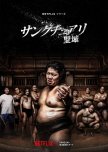
Sanctuary: Sacred Area
6 personnes ont trouvé cette critique utile
Cette critique peut contenir des spoilers
Drop your ego and find you own Sumo
This is a brilliant series ... 10/10 for me ... the script, the production, the score, the cinematography, the acting was brilliant.The cinematography was amazing ... the 'stop action' ... the slow motion which allowed the view to see and appreciate the things you don't get to see in the fast and furious clashes in the rings ... like the way the energy from the clashes pass from one body to the other, the sweat, the dirt, the look in the combatant's eyes ... amazing.
The script was nicely put together ... you could watch the series from a number of different levels. For me, the series is not just about the mystique of sumo or the regimentation and ritualism that it has been steeped in for over 1500 years ... it was about Sumo's descent into hypocritical sanctimoniousness ... the brutal dog eat dog world in the Stables which is the seedy underbelly of all that 'noble' ritual ... it is about the personal stories and drivers behind the rikishi ... young men who come to the dohyo with their own individual baggage ... it is about the true spirit of sumo and what happens when ego's are left behind and these big men find their own 'sumo'.
For the few minutes (but mostly less than a minute) of something that seems so innocuous as pushing someone to the ground or out of a circle ... the lead up to those few minutes is brutal, it is a test of heart and soul and body. These big men are amazing ... it is in no way an easy life that is for sure.
I loved that real Sumo Rikishi also stared in the series like Hishofuji Hiroki (1.92m tall and 201kg ... wow) who played the character of Shizuuchi. When he retired from Sumo he moved to the USA. Even as the scarred Shuzzuchi, that man has the most beautiful face and expressive eyes ... wow. Ichinose Wataru (not a Sumo Rikishi) who played Oze Kiyoshi / Enno, was just brilliant and so believable. He blew me away ... the anger, the rage, the depression, the fear and then the passion and exhilaration of finding his Sumo ... just brilliant. The back stories of these two characters ... both 'bad boys' ... had me reeling. Their lives outside of the Sumo Stables were tragic ... it was interesting to see how each man reacted to the tragedy of their lives. Once in the Stables it was another cruel world for them ... again, it was interesting how they responded to that cruelty.
As for the Ensho Stable ... the evolution of the Rikishi from brute savages to Rikishi who found their own Sumo, was hard to take at first but then became inspiring.
The side stories were interesting too, and while they were not fully explored, it provided the driving context to what drew these big men, Shizuuchi and Oze to Sumo and kept them there. Enya's retirement hair cutting ceremony was very moving ... for something that these men eat and breath for so much of their lives, retirement must feel like a form of death for them ... the hair cutting ceremony for Enya had me in tears as did Ensho Oyakata's response to him just before he finished cutting Enya's Sumo top knot.
All these different aspects ... the best and worst of Sumo, the ritual and spirituality of it; the association that regulates it and the individual stories ... makes this a very moving and compelling series. I especially loved the end ... when I was thinking of Shizuuchi and Enno I was worried about how it would end with these two ... but the end was exactly what I hoped for ... it was a perfect ending◝(ᵔ‿ᵔ)◜
This is an amazing story, brilliantly acted and produced ... I loved it.
Cet avis était-il utile?
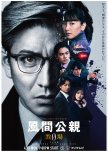
Cette critique peut contenir des spoilers
"Know Thyself"
As a 'cop show' it was just kind of average for me ... but as an expose into the human mind, it was fascinating and introspective.The first couple of episodes were slow but from episode 3 it started to turn into so much more than I expected. It takes you through a gamut of emotions around some very emotive topics ... child abuse, spouse abuse, elder abuse, dementia, young lives cut short etc ... all the while peeling back the shadow layers of the minds of the police graduates who want to become detectives and shine a light on the drivers of human behaviour - both theirs and the people they are investigating. Ego and self-delusion ... weapons of mass destruction that reverberate across society and generations.
Kazama's training method is very interesting ... his "Dojo" was not so much about solving cases (thought it did do that) as it was about solving 'people'. Kazama's powers of perception are phenomenal to say the least ... if you survived him, you definitely come out a transformed and better human being and a better police officer / detective.
While watching it I was reminded of the inscription on the Temple of Apollo in Delphi ... "Know thyself" ... it is a very loaded, two word statement ... one which I thought had ample play in this series. Everyone's life was touched by a shadowed or hidden heaviness ... quiet desperation bleeding out of the edges of the shadowed self ... no one is immune ... not even a semblance of 'control' (like Kazama's) or lack thereof (like Kenji's) mitigates its covert permeation into everything and anything they do or say ... it may be held back for a time, but if unaddressed there will come a tipping point of no return where that shadow self unleashes itself ... often having a devastating domino effect on the lives of others around them. Kazama challenges his learner detective's world view through concepts of 'blind acceptance' ... how often do we blindly accept what we see and hear and never question it ... and equally, how often do we blindly accept our own justifications / rationalisations about ourselves and our world view without ever challenging it?
Kazama was like some kind of Kamisama ... every case seemed tailored made for each one of his 'learner' detectives ... kind of corny in a way but I didn't mind this seemingly impossible correlation because, through those 'tailor made' cases, these police officers got to face their 'shadowed' selves, and their 'shadowed' past. Before Kazama, they did NOT know themselves very well or to their full extent ... they were totally ignorant of aspects of themselves or were in denial of it or were so traumatised by it that it was 'blocked' from memory. However, once they faced it, accepted it and incorporated that knowledge into their here and now lives, they became better people, better detectives and more open to their own ongoing personal evolution, more open to the lives and drivers of others ... and that is a good thing .. it makes for a better detective and a better human being ... a double plus.
The series gives much pause for reflection about the human condition. It was sad to see the remnants of one's life being left behind or discarded ... the beautiful flower gardens, abandoned and withered ... the photographs of dreams and hopes now stained with the rusty colour of blood, no longer to be looked upon with expectation, joy and determination to succeed ... a ring, loaded with wonderful memories of times passed but never to grace the hand of the one who it was given to ... photos of a woman whose mind was so vibrant and in love but was hardly a shadow of its former functionality, and yet that woman gave her murderous husband her final cogent thought before passing ... 'a get out of jail' card by deleting that last message ... ahhh so sad, so poignant ... as I thought of all these things, I burst into tears the same time Kazama did ... being human is a bloody tough gig.
Symbolism throughout was very well done and poignant ... like a child literally branded by both parents "ma Ma" ... Tono's flower bed restored to its colourful glory - a visual reminder of the potential and the shortness of life, here one day and gone the next. The cinematography with all the muted interiors, reflective surfaces ... symbolic of how we 'mute' aspects of our minds, of our lived experiences ... how what we see is often not the 'original' thing but a reflection of the original from some other thing/person ... how the lack of clarifying light on the 'real thing' impacts what and how we see things around us and ipso facto how we respond / react to it.
The OST was beautiful and melancholy at the same time ... it suited the story well ... though I did not understand the lyrics.
The final scenes of the last episode shows a sudden ominous breeze in the trees at the police academy, a "here one second gone the next" Tozaki asks "Where is my sister?" ... all those murders to get an answer to this question? Does the answer lie within Kazama's own shadow past? I wonder.
I really liked this series ... from a slow beginning it took me into a deep dive of the human mind ... a poignant and reflective and at times deeply sad story ... worth the time to watch imo.
Cet avis était-il utile?

Cette critique peut contenir des spoilers
Truths omitted are as bad as the Lies told
I really liked this series ... I was in the mood for some angst but was surprised with something else.The scripting for each character was strong ... I think it was purposefully like that so you could form a strong opinion about them ... only to have those opinions broken down when the PoV was changed in the next episode. This technique of revealing the inner mind of the characters by changing the PoV was really clever given the title of the series. I couldn't help but wonder over and over at how drastically our opinions change when presented with the truth ... it is not just the lies that alter perception, it is the truths that remain unspoken that alter perception as well.
The zigging and zagging with what the main characters told each other and what they didn't tell each other, was super frustrating but instead of ending up in an abyss of misery it was heading somewhere. There was a lot of personal evolution going on with the characters and I liked watching how that unfolded and seeing what the catalysts were that moved that personal progression.
I was over the moon at how the ML Ichikawa Kazuya found himself ... he leveled up from a troubled 15 year old in an adult's body to a man matured who knows his own mind, faces his truth and is willing to put it out there ... and all without burning his bridges ... I was impressed ◝(ᵔ‿ᵔ)◜
Communication is a powerful thing ... truths omitted are just as bad as the lies told ... life is tough enough already with plenty to suffer over, no need to add to that the pain of regret for untold truths and lies spoken ... this story portrayed that theme very well. I was glad for a happy ending.
As an aside ... it was nice to see SatoTaiki and Mikami Ai getting into their kiss scenes ٩(✿ ^ᴗ^ )۶
Cet avis était-il utile?
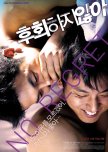
Cette critique peut contenir des spoilers
A first class story telling ... you will be saying 잠깐 만요 !!! at the end
A hard hitting 2006 story that takes you on a roller coaster ride. It is powerfully scripted and very, very well executed by the actors and production team. I wish I could add that in BOLD type ... the movie blew me away. Korea has produced a few golden oldies in this genre that are absolutely first class ... and this is one of them in my opinion. I have watched this several times and have absolutely 'no regret' doing so, there is always something to take away from watching it ... how to be a better human being.It makes me wonder what the hell happened since 2006 that made Korea go all coy on these more realistic life stories ... not that I don't like the current crop of post 2020 Korean BL's but I like these stories too because, more than anything, they cast a powerful light on the human heart and all the complexities of thought and emotion that surround the character's world view of life and love and attraction and struggle and pain and death and what makes you keep on going ... or not as is sadly sometimes the case.
Spoiler: even though I have seen this movie a several times ... it always has me in tears .... those last few scenes of beautiful Ga Ram (Kim Dong Wook played that character beautifully) ... are just heart crushingly tragic 。:゚(;´⌓`;)゚:。. Why do the beautiful souls go so soon?? When Song Jae Min is calling Lee Su Min and can hear his phone call in the car park ... I just want to scream out 잠깐 만요 !!! The movie really draws you in ... it is that good ... AND ... and there is a cheeky surprise ending \(‾‿◝ )/
Cet avis était-il utile?
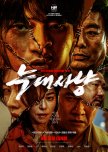
Cette critique peut contenir des spoilers
It put the "over" into "overkill" and the "E" into "evolution"
WOW this was an awesome ... bl00dy and gory ... but mind blowing movie.The beginning of the movie.
They definitely put the "over" in over kill ... it was saturated in blood and guts and bones and brain matter (。ꏿ﹏ꏿ。) Initially I wondered where the hell this story was going to ... I decided to stick around for two reasons:
1. Seo In Guk. OMG what a transformation!! He has such an incredible acting range ... it is always a pleasure to watch his work.
2. to see what the go was between Jang Dong Yoon who plays Lee Do Il and the "Korean-stein" ... as there seemed to be some connection there. I am glad I did.
The middle of the movie.
I found this to be quite historical and evolutionary. Historical because of the links to the Japanese Empire's Surgeon General Shiro Ishii and his Unit 731. They were infamous for diabolical and horrendous medical atrocities perpetrated upon civilians and whole villages throughout Japanese occupied territory in WWII. In an International Military Tribunal for the Far East, the United States Government gave Ishii immunity from prosecution of war crimes, in exchange for information and research for the U.S. bio-weapons program. A diabolical act in itself ... one that not only spits in the face of every single victim who was tortured and died at their hands but humanity in general. BUT here is the thing ... it is not just a Japanese thing, or a USA thing ... it is a 'any country' thing (as we find out later in the movie). The middle was also evolutionary as, at the end of the day, evolution is no respecter of persons, it really is survival of the fittest ... be it cerebrally or physically or both ... it will cut through egoic human pretentions like butter. Humans messing with human DNA ... evolution is going to kick in somewhere along the line and it may very well come back and bite humanity as it is.
The end of the movie.
The end was a bombshell. The ship - such a powerful allegory to the world - initially it was humans fighting humans on the ship ... then it was the monster fighting humans ... then the humans were all wiped out leaving monster fighting monster ... it was almost Tolkien, one monster to rule them all. The last scene ... so powerful ... the father of new life emerges from the ocean, as if in homage to that first primordial life form that first set its "foot" on land ... he walks into a new world passing by the refuse of the humanity ... the humanity that he and his kind will replace ... because it is survival of the fittest.
WOW ... this was an epic movie ... a multi-level plot that you could do a deep dive into if you wanted to ... brilliantly acted ... definitely rewatchable ... loved it.
Cet avis était-il utile?
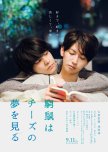
The Cornered Mouse Dreams of Cheese
2 personnes ont trouvé cette critique utile
Cette critique peut contenir des spoilers
"Dream Cheese" or "Real Cheese" that is the question
"A Cornered Mouse Dreams of Cheese". A very apt title for a very thought provoking movie. NSFW warning: consensual, but explicit, gay sex scenes and some rear nudity.There is a sad melancholic, masochistic kind of desperation about all the characters in this movie. They are all very much 'cornered mice dreaming of cheese' but never actually getting any cheese. It becomes clear in the course of the movie that each character's "dream of the cheese" became more important than actual getting of the real 'cheese', and because of that their lives got 'cornered' and limited by clinging to the dream for cheese, instead of the real thing when it came their way.
Kyoichi doesn't really have any deep connections with anyone. When people latch on to him, he has no objections ... easy come, easy go. Some clung to him as a 'lesser suffering' alternative to their lonely single lives ... they said they 'loved' him but did they really? What was the basis for their love for Kyoichi ... is that really love 🤔? Wataru has the measure of Kyoichi when he tells him, "You'll have anyone who loves you, but ultimately you cannot trust that love, so you sniff out the feelings of whoever comes near you."
To one degree or another I think all the characters who wanted to connect with Kyoichi knew that their dream of 'love' with him was futile ... and yet they persisted anyway. As an oblique response to this kind of grasping, Kyoichi gave Wataru a very poignant question and a statement ... one which I think the whole movie revolves around and is relevant to not just Kyoichi but to all the people who were interested in him:
"What do you want? There are a billion things in life more important than suffering for love."
All the characters got themselves cornered by clinging to their dreams of cheese, to the point that the actual 'cheese' was no longer their objective. When Kyoichi broke off his engagement with Okamura Tamaki, he tells her it is because his Ex came back and that, even though the Ex walked out on him again and probably for good this time, he wanted to wait for him. Kyoichi time and again lets the real cheese go ... and instead holds fast to the 'dream' of cheese instead. Even the last scene at the beach when Wataru comes back ... again ... Kyoichi lets him go with a "sorry". Kyoichi is on an iterative dream loop ... he will never get the taste of real cheese ... and neither will Wataru who ebbs and flows out of Kyoichi's dream of cheese.
Okamura is dreaming of cheese too, and an escape from her real life. She knows Kyoichi isn't the real 'cheese' and yet, despite Kyoichi breaking of the engagement to wait for his Ex to return, she pleads with him, "Can't I stay with you? If she comes back, I will step away quietly." A billion things more important than suffering for a dream of love ... but that is what she chooses ... she too has cornered herself in the dream of cheese that isn't real cheese ... the dream of love that isn't real love at all ... just like a menu isn't the same thing as the food.
Everyone cornered by the dream of cheese ... to one degree or another, at one time or another, we too in our real world can/may get cornered by our own "dreams of cheese" and miss the real cheese when it comes to us front and centre ... it is a situation worth thinking about. Dream away but when the real thing comes ... don't get cornered by the dream, grab the real cheese and run 🧀🏃♂️💨
An excellent thought provoking movie ... I am sure the manga would also be just as poignant if not more so.
Cet avis était-il utile?
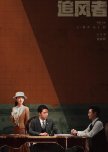
Cette critique peut contenir des spoilers
War of Faith | A "Long March" of the heart and mind
10/10 ... an EPIC and SUPERLATIVE productionThere have been some very good Cdramas over the years ... from the ones I have watched, this series is at the pinnacle ... the script, the production, the sets, the score and the acting ... better than 10/10 ... it was an absolute 100/10 for me ... from episode 1 right through to episode 38. The story and pacing, the acting and production never dropped ... it just kept getting better and better. Put all together I have never felt for drama characters as much as I felt for the characters in this story ... it was so life like, so replicated the gut wrenching, gritty tragic realities of life lived in chaos. Wang Yibo ... my god ... he blew my mind with his acting ... his acting was a force of nature ... every nuance, every microexpression ... he totally nailed it, TOTALLY.
It has kept me on edge all the way through. The sets and the cinematographic atmosphere really brought the story 'alive' ... I can almost smell the bank and the alley ways ... feel the roughness and smell of the clothing ... the coldness of the water when Wei Ruolei washes his face .... so well acted and produced ... it really gets you into the lives of the characters.
The story is nerve wracking ... the cruelty and sheer struggle to survive ... the 'cheapness' of human life starkly contrasts with the lives and lifestyles of those well-endowed with money and status. I couldn't help but wonder how many people in the world are like Wei Ruolai ... people who have such brilliance and passion ... but who never get to 'bloom' ... they are lost to the 'world' because they got trampled under the heavy feet of ideology, status and money.
I was deeply moved by the rawness of the environmental and personal reality of war ... the ideological wars of faith, economic wars of faith (within China and those internationals with vested interests in China e.g. German and Japan) ... and the psychological wars that goes on in the hearts and minds of each and every individual to survive and protect what is important to them ... not just the high level stuff of ideology, morals, ethics etc but the day to day requirements of survival ... food, clothing, shelter, safety and an inbuilt desire to 'thrive' ... how to navigate betrayal and the death of loved ones, how to manage the onslaught of chaos, the overwhelming sense of powerlessness and despair ... in this sense not one character in this series was a gap filler, every single character and NPC was relevant ... they showed that this internal war is one that wages in the hearts and minds of every human being regardless of time, country or ideology ... making this series a truly powerful and profound multi-level drama ... I am blown way.
For all these characters it really was a 'long march' of heart and soul and not just the Long March of the Red Army from Jiangxi
A great sadness for me was how the powers to be (regardless of which ideology they held) used people like Qian Song and Tu Nan to be their tools ... weapons of mass destruction that were manipulated and used by the powers to be so they did not have to get their hands dirtied with the blood, sweat and tears and guts of all the people and children that fell victim to their game play ... such tragedy ... what makes it even worse is that despite hopeful beginnings ... there is not one organisation on this planet that hasn't succumbed to the power hungry who use ideology and systems for their own benefit at the cost of the people it was meant to support.
I was so glad of the ending ... Jin Zhen 'saving' her brother after she had died ... not just with a bullet proof vest but with her 'faith' as well ... (´╥︵╥`) that was so moving. Tu Nan revealing his true faith after he shot Qian Song and pointed the gun at Rou Lai ... (´╥︵╥`) and their final coming together as 'brothers' ... OMG I was in tears.
Just as an FYI (from Wiki pedia) The Long March (referred to in this last episode) was a military retreat by the Red Army from advancing Nationalist forces during the Chinese Civil War in 1934 through 1936.
The most famous of these marches was undertaken by the First Red Army under the leadership of Mao Zedong. Departing from their headquarters in the southern province of Jiangxi on 16 October 1934, the 65,000-person First Army marched more than 9,000 kilometres (5,600 mi) in a large clockwise arc through the western frontiers of the country, ultimately meeting with other Communist forces in Yan'an on 19 October 1935. The circuitous route brought the First Army through some of the most difficult terrain in the country while pursued by the Nationalists: at first the NRA under Chiang Kai-Shek, and later by local cliques of Nationalist-aligned warlords. Fewer than 8,000 people traveling with the First Red Army survived the march.
A War of Faith indeed ... well worth watching and definitely worthy of repeat watches ... 100% recommend it.
Cet avis était-il utile?

Cette critique peut contenir des spoilers
When taboos heal what society destroys
i really liked this series alot ... each episode came packed with some very thought-provoking observations on the lives and struggles of different people and how they seek to overcome those struggles in a socially non-conventional and even 'taboo' way.
The most poignant thing that really struck me was how people's engagement in 'looked down on" / 'taboo' activities of the sex industry actually cast a light on those aspects of social living ... of society ... that had absolutely failed to deliver in respect of the care, nurture and provision of opportunities and support for people to authentically thrive as a unique person. Society mindlessly 'cut' people down, mind, body and soul. Their silent cries for help unheard in mainstream society ... and yet they were heard by the "Kirameki" therapists and other like businesses.
In this series we got to see people heal from the tragedy of their lives - all the characters who paid for Kirameki therapy, desperately needed something that they were not getting in their personal and social lives ... even Toshiki and his own (ex) wife. In this sense Kirameki was not a 'dirty business' at all ... it saved lives, provided non-judgmental acceptance of their clients as human beings of worth, helped their clients fill the missing pieces in their lives, allowing them to thrive moving forward, freed from the abuse and abusive mind sets forced upon them by society.
While in real life this is not always the case and taboo activities can be very dirty and very abusive in on of themselves, this series none the less provided a fascinating observation of how something that is taboo actually highlighted and gently filled in the very significant gaps and abuses that social living inflicts upon its members.
Very thought provoking indeed. Well worth the watch and definitely rewatchable imo. The only downsides for me was the OST ... I just found it really annoying ... and I would have liked to have seen more episodes on the other two therapaists ... but despite that, this is still an awesome little series.
Cet avis était-il utile?

Brilliantly executed mind-bending, thought-provoking movie
An intense mind-bending, thought-provoking movie ... it will not be everyone's cup of tea due to the themes it revolves around ... but I loved it and thought it was brilliantly executed. The cinematography was mind bending, the score, the script ... the awesome out of the box, blow your mind ending ... all brilliantly executed. If you are feeling depressed, I would not recommend you watch this movie as you may find yourself doing an even deeper dive into questioning your own existence ... just saying.The cinematography, the score and the sounds throughout the movie beautifully complemented the actors and conveyed a psychological context that is beyond words. The use of colours; lights and shadows; cinematic focus points where the out-of-focus points were as important as the in-focus points; the sets ... all were just amazing and mind bending. There was just so much in this little movie ... it was kind of ethereal and yet had a touch of "Fight Club" about it ... the concepts of 'separation' and 'alienation' were palpable. There were elements of humour (in the beginning) in amongst all the philosophical confusion, angst and pathos.
There are some very deep philosophical concepts embedded in this movie ... time and waste of time ... life and death ... 'alive' but 'dead' ... 'dead' but 'alive' ... futility ... the purpose for 'being' ... alienation from self and from others ... social vandalism ... the 'system' vs chaos ... mind vs mindlessness ... there was even a 'cult' feel in the aggregation of social 'misfits'/'rebels' ... Marvel Comics' supervillian Thanos ... Nietzsche and his concepts of master and slave morality, nihilism, death of god, affirmation of life, perspectivism et al ... "Everyone is betting their lives on something." So much to think about and see in action in this movie.
"All humans who do not think and act with their own heads are our targets of attack. Getting on the system of the rotten world and doing well, it's the same as reproducing the system."
The 'war' against some 'thing' ... or betting your life on someone/thing is always interesting to me ... embedded within those concepts is you/what you want against the 'other'/what they want and yet one has no meaning without the other, cannot exist without the other ... both 'sides' are eternally bound together ... 'up' has no meaning without 'down', 'shadow' has no meaning without 'light' ... 'system' has no meaning without 'chaos' ... indeed is not chaos a system in itself 🤔 ... and in the end we all die anyway 😄 ... human consciousness is such a mind bender lol.
Cet avis était-il utile?

Cette critique peut contenir des spoilers
Mind Bendingly good ... literally
WOW this was a surprise masterpiece ... a beautiful feast for the eyes and ears and mind ... the script was so psychologically intriguing and fascinating 🙌 I have seen the anime and I really liked it too but I will just write about this movie as if it were a stand alone production.The effects were brilliant from the galaxy in the sky to the golden dragon to the dream world ... it was beautifully done I thought. I loved the cinematography ... the different angles taken, the contrast between the often muted, blurry and dark gloomy backgrounds, which were 'lit' up by such vibrantly luminous colours in the costumes... the beautiful ultramarine blues, permanent roses and rich cadmium oranges ... as well as the luscious quinacridone gold rays of light that broke through the gloominess. It was so visually delicious. The costumes of the female characters were beautiful and exotic looking and I loved seeing their lovely black hair loose, the length of which nearly fell to the ground ... a beautiful combination that oozed a exotic kind of simplicity.
I loved the theatrical stage feel to many of the scenes ... it worked beautifully with the imagery and various sound effects from the natural surroundings and from the music and also just from the 'silence'. I loved hearing the sounds of bare feet walking and running of the wooden floor boards, the rustle of the long robes, the silence that was broken by the ethereal sounds of the flute ... calming, mysterious and hauntingly beautiful. I loved those kind of kabuki sounds when that 'demon' person was dancing his curse on a stage. It was a wonderful auditory feast.
I loved the 'old' kind of lore presented in this movie ... it was as if it predated the sort of yokai and oni I see in anime and manga. This was so fascinating especially when contrasted against the cool level headed observation and logic of Abe Seimei. The symbolism was profound ... how it linked to the incredible power of the mind and it's 'blind spots'. The way those old masters took advantage of those weak spots to manipulate and perpetuate their power base. It was a covert old school craft of misdirection, manipulation and social engineering ... taking advantage of not only how the mind works but also of people's egoic weakness and desires. This was really brilliant.
I liked Seimei's character and Kento did a good job with it. I liked the kind of cool arrogance he had in contrast to the foolery of all the apprentices and their masters. I liked his value system regarding the trickery and the perpetuation of superstition just to keep their power base and social and political hierarchy.
It was interesting to me that in spite of that he still took the role of Artificer .... in thinking about why he did that, I see method in his choice ... there are many manipulators out there that can, and do, wreak havoc among the populace ... by taking this position and therefore putting himself in line to work with the emperor ... his is like a Yin to their Yang ... a counterweight balance. Nice ◝(ᵔ‿ᵔ)◜
I really liked this little movie ... it was jam packed with all sorts of wonderful things ... and is definitely rewatchable. I really enjoyed it and it was a 10/10 movie experience for me as it kept me engaged mentally, visually and auditorily ゚:・*・:(๑ᵔᴗᵔ)・:*:・゚
Cet avis était-il utile?
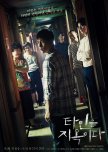
Cette critique peut contenir des spoilers
Hell is empty and all the devils are here
This disturbing series is loaded with mental and physical violence partnered with philosophical symbolism and deep psychology.If you have worked in or experienced the dark underbelly of human existence, the scenarios presented in this drama are not dissimilar to reality at all ... how a series of events and/or encounters with certain people over time can tip a person to lose their humanity ... childhood abuse, workplace abuse, societal abuse where you have to toe the line or face the consequences ... all leading to the buildup of intense suppressed rage ... and then implosion or explosion. Passive aggressive people seem to better manage this suppressed rage within the societal confines of propriety, but this method doesn't work for everyone one ... like Jong Woo ... he couldn't vent that rage into passive aggression, instead he could only imagine what he really wanted to do. The times he went 'physical' he got 'punished' which lead to more suppression.
It was fascinating how Moon Jo kept encouraging Jong Woo to be "truthful" ... to be authentic. It is very commonplace in the workplace and in social media to hear people telling you to "be your authentic self" ... people spew this phrase out like they were gaining merits or treasures in heaven. What does it mean to be your authentic self when you have all this suppressed rage that cannot be expressed in the family or the society or the workplace or the country you are in??? It is impossible ... especially when you have been psychologically 'invaded' and 'conquered' by abusers in your life.
The seeds of Jong Woo's metamorphosis were always there, even before he came to "Eden". Jong Woo just needed a little 'nurturing' to tip the scale... and that is exactly what Moon Jo did ... in the same way that Eom Bock Soon did to him and the twins ... Moon Jo hijacked Jong Woo's mind like a virus and psychologically became wedded to him ... calling him 자기야 . How symbolic was the name "Eden" for the place where this metamorphosis occurred ... like Adam and Eve, Jong Woo became 'corrupted' in 'Eden' and was then cast out into the world.
When Moon Jo said they could never kill him because there were too many of 'him' ... he was 100% right ... with a plethora of "Eom Bock Soon" and "Moon Jo" type parental figures / institutions / work colleagues etc ... the next generation is guaranteed.
Jean-Paul Sartre (existentialist philosopher and playwright) said in his play "No Exit":
"Hell is other people"
They mentioned this quote in this series. Sartre was of the view that humans were very much aware of how other people perceive them and that because of this awareness and the subsequent changes they make in response, they lose their freedom to be their original authentic selves. Not being able to be your authentic self and even be punished for it ... well that leads to all kinds of dramas ... just like this one ... an age old drama. Even William Shakespeare was across such a theme ... in his play "The Tempest" he wrote:
“Hell is empty and all the devils are here.”
Acting: The performances of Yim Si Wan, Lee Dong Wook, and Park Jong Hwan (played the twins) were outstanding.
Script: The scripting was generally of a high standard, but I felt that it went too slow in some places particularly some of Jung Hwa story scenes with her family/father and investigation processes ... I didn't think that really added much value to the story. I am glad that it was only 10 episodes (in my view it could have been less) as to flash it out to the usual 16 episodes would have totally destroyed the point of watching this blood bath and psychological descent into hell.
I found the scripting for the police scenes annoying and tropey - arrogant, presumptive know it all seniors and juniors going off half cocked doing their own thing (even though it was with good intentions and reasonable suspicion and because she got no support from her colleagues/line supervisors).
Rewatch - if you are into heavy brutal psychology and existential philosophy ... yeah it is worthy of a rewatch.
Overall: A disturbing series, but brilliant in its profound look at the human psyche in a repressed social context.
Cet avis était-il utile?

